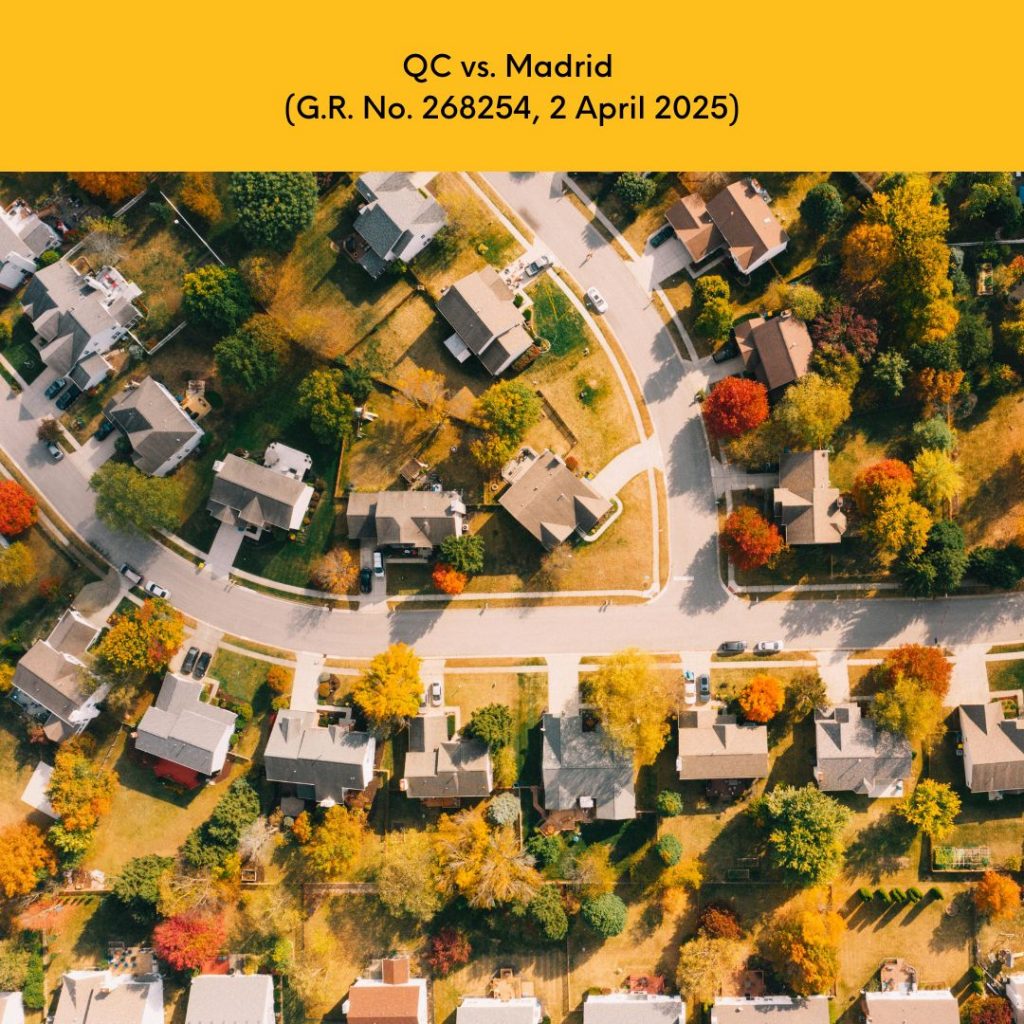
Published 15 September 2025, The Daily Tribune
In a landmark decision, the Supreme Court of the Philippines has emphatically ruled that local government units (LGUs) cannot acquire ownership of subdivision open spaces, road lots, or other similar common lands unless there is a written deed of donation, duly accepted. No amount of reliance on subdivision ordinances or homeowner resolutions substitutes for this legal requirement.
The dispute involves Capital Park Homes Subdivision (CPHS) in Quezon City. A taxpayer and resident named Rainier L. Madrid filed a petition challenging the city government’s use of public funds to maintain or improve certain open spaces and road lots within CPHS. His contention: these lands had never been formally donated to the city; hence, they remain private property.
The city government pointed to Ordinance No. 5852, Series of 1964, which required subdivision developers to dedicate at least six percent (6%) of their land for public use before approval of subdivision plans. The subdivision plan for CPHS was approved in 1969, showing that the dedication requirement was met under ordinance. However, the city could not present any deed of donation.
The Capital Park Homeowners Association admitted the absence of a deed of donation but referenced a board resolution indicating a turnover of these areas to the city. Still, there was no formal documentation showing legal ownership change via donation, nor proof of acceptance by the city.
Associate Justice Jhosep Y. Lopez, writing for the Second Division, made clear that:
- An ordinance mandating open space dedication in subdivision plans does not by itself effect a transfer of ownership. Without a written deed of donation plus proof that the donee (i.e., the LGU) accepted the donation, the property remains with the developer.
- Resolutions from homeowners’ associations or similar instruments are insufficient in themselves to satisfy the legal requirements of donation. They cannot replace a formal deed.
- The Civil Code requires that a donation of an immovable property (like land) must be in writing. Open spaces and road lots in subdivisions are immovable property. Therefore, the absence of a written deed invalidates the claim that those portions have been legally transferred to LGU ownership.
Accordingly, the Supreme Court upheld the Court of Appeals decision, finding that CPHS’s open spaces and road lots are still private property of the subdivision developer (VV Soliven). They remain so until and unless the developer executes a written deed of donation and the LGU accepts it. The petition to force government ownership was denied.
This ruling rests firmly on existing legal doctrine:
- The Civil Code’s provisions on donation: For immovable property, donation must be in writing. Written acceptance by donee is part of what perfects the donation.
- The principle that mere compliance with ordinance requirements (such as setting aside open spaces in subdivision plans) does not equal legal transfer of title.
- LGUs must prove ownership before investing in maintenance, improvements, or governing common subdivision areas claimed as public. Without the deed, there is risk of legal challenge and misuse of public funds.
What it means for stakeholders
- Local Government Units (LGUs)
- Must require that subdivision developers execute a deed of donation whenever there will be open spaces, roads, or other lands for public use.
- Must ensure formal acceptance of donated property is documented.
- Should verify documentation before approving subdivision plans or using public funds on subdivision land.
- Subdivision Developers
- Should ensure that dedication of open spaces is not only reflected in plans and compliance with ordinance but also in the execution of a formal deed of donation.
- Must work with LGUs to guarantee acceptance, to avoid uncertainty over ownership or liability for maintenance.
- Homeowners Associations & Residents
- Should demand transparency regarding the status of subdivision common areas. Are those areas owned by the developer or transferred to the LGU? Is there legal documentation?
- When LGU claims ownership (for instance, collecting taxes, budgeting improvements), residents have a legal basis to request proof of written donation and acceptance.
The Supreme Court’s decision clarifies a frequently misunderstood issue: that legal ownership of subdivision open spaces and road lots does not automatically pass to LGUs by virtue of ordinance or plan dedication alone. A written deed of donation, accepted by the donee, is indispensable. Without these, those lands remain private property, no matter how long they may have been treated like public spaces.
For LGUs, developers, homeowners and legal practitioners alike, this ruling underscores the critical importance of formal legal documentation in land transfers. In Philippine real property law, form matters—not just intention or local custom.
For more of Dean Nilo Divina’s legal tidbits, please visit www.divinalaw.com. For comments and questions, please send an email to cad@divinalaw.com.

